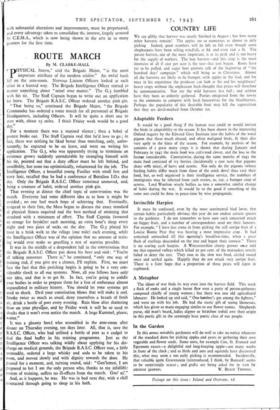COUNTRY LIFE
WE say glibly that harvest was nearly finished-in August ; but how many other harvests remain! The apples are so numerous as almost to defy picking Indeed, great numbers will be left to fall even though some shopkeepers have been selling windfalls at 8d. and even tod. a lb. The potato harvest, one of the most important, is at its peak and is too heavy for the supply of workers. The hop harvest—and this crop is the most intensive of all if cost per acre is the test—has just begun. Roots have yet to be pulled, and sugar beet growers talk of the beginning of " the hundred days' campaign " which will bring us to Christmas. Almost all the harvests are likely to be bumper, with apples in the lead, and for once in his experience the producer can look at his and his neighbours' heavy crops without the unpleasant back-thought that prices will therefore be unremunerative. Nor are the wild harvests less full ; and seldom have they been so ardently gathered. Parties emigrated from the towns to the commons to compete with local housewives for the blackberries. Perhaps the popularity of this desirable fruit may kill the superstition that they are devil-marked from October 1st.
Adaptable Feeders It would be a good thing if the human race could or would imitate the birds in adaptability to the season. It has been shown in the interesting Okford inquiry by the Edward Grey Institute into the habits of the wood pigeon that these much abused, and often maligned birds, fit their diet very aptly to the hints of the season. For example, by analysis of the contents of a great many crops it is shown that during January and February in 1942 the main food was cultivated clover, and the loss to the farmer considerable. Contrariwise, during the same months of 1943 the main food consisted of ivy berries (incidentally a rare taste that pigeons share with mice), of haws and acorns. Not only do the pigeons (whose feeding habits differ much from those of the stock dove) thus vary their food, but, so well organised is their intelligence service, the numbers of immigrants may be inferred from such events, as, say, a bumper crop of acorns. Lord Woolton wisely bullies us into a somewhat similar change of habit during the war. It would be to the good if something of the same sort could be done in peace-time by wise propaganda.
Invincible Harpies
It must be confessed, even by the most sentimental bird lover, that certain habits particularly obvious this year do not endear certain species to the gardener. I do not remember to have seen such concerted attack on bigger fruit, and a number of correspondents send me their laments. For example, " I have just come in from picking the still unripe fruit of a Louise Bonne Pear that was bearing a most impressive crop. It had remained untouched till this naprning's breakfast-time, when a great flock of starlings descended on the tree and began their carouse." There is no scaring such harpies. A Worcestershire cherry grower once told me that repeated volleys which killed 20 per cent. of the marauders utterly failed to deter the rest. They rose as the shot was fired, circled round once and settled again. Happily they do not attack very unripe fruit. There is a faint hope. that a proportion of these pears will ripen in cupboard.
A Metaphor
The idiom of war finds its way even into the harvest field. This week a flock of rooks and a single heron flew over a party of potato-gatherers composed chiefly of young women ; but there was one old agricultural labourer. He looked up and said, " One bomber's got among the fighters," and went on with his job. He had the rustic gift of seeing likenesses, which has given so many engaging similes to our flower names. Shepherds purse, old man's beard„ladies slipper or birdsfoot trefoil owe their origin to this poetic gift in the seemingly least poetic class of our people.
In the Garden In this annus mirabilis gardeners will do well to take no notice whatever of the standard dates for picking apples and pears or gathering their own vegetable and flower seeds. Some sorts, for example Cox, St. Everard and Egremont russet—a delightful and long-keeping apple—are many weeks in front of the clock ; and as birds and ants and squirrels have discovered this, what may seem a too early picking is recommended. Incidentally, that valuable apple Gravenstein (reintroduced, I think, by Barnard) seems to be surprisingly scarce ; and grafts are being asked for in vain by Postage on this issue : Inland and Overseas, ad. •


























 Previous page
Previous page